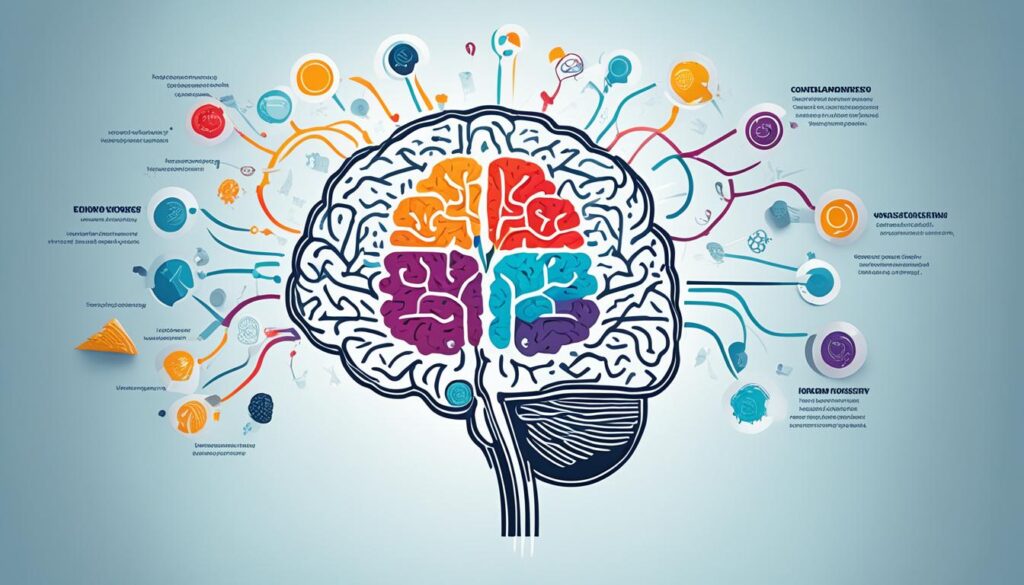Can a leader’s ability to feel truly set them apart in today’s fast-paced business world? In leadership coaching, empathy is a key force. It changes relationships and boosts team performance. This emotional intelligence is changing how we see effective leadership.
Empathy in leadership means more than just listening. It’s about deeply connecting with team members’ feelings and views. By feeling and sharing others’ emotions, leaders can change their coaching. This leads to a more supportive and productive team.
Consider JB Pritzker’s approach. He believes true leadership means walking with team members, sharing their highs and lows. This shows how empathy can be at the core of leadership coaching. It builds stronger relationships and drives success together.
Leaders like Nelson Mandela also showed empathy’s power. He connected with people across differences, helping end apartheid and heal the nation. Jacinda Ardern’s kind leadership during tough times showed us that empathy is a strong leadership trait.
Key Takeaways
- Empathy is key to becoming a great leader
- Good leadership coaching means feeling a deep emotional connection
- Empathetic leaders build stronger teams and achieve more
- Historical leaders prove empathy’s role in overcoming big challenges
- Kindness and understanding are leadership strengths, not weaknesses
Understanding the Essence of Empathetic Leadership
Empathy in leadership is key to strong team bonds. It’s about connecting deeply with people, not just at work. Leaders who excel in empathy make sure everyone feels important and heard.
Defining Empathy in Leadership
Empathetic leadership means putting yourself in your team’s shoes. You understand their struggles, fears, and dreams. This builds trust and encourages open talk. When leaders show they care, teams share more ideas and concerns.

The Impact of Empathy on Team Dynamics
Empathy changes team dynamics for the better. It spreads positivity in the whole organization. Teams with empathetic leaders are more engaged and happy at work. This leads to more productivity and creativity. People do more when they feel understood and valued.
Historical Examples of Empathetic Leaders
History shows us great empathetic leaders. Nelson Mandela forgave and united a divided nation with empathy. Jacinda Ardern showed compassion during crises in New Zealand. These leaders show empathy is a strength, not a weakness. It can heal and motivate people.
“Leadership is about empathy. It is about having the ability to relate to and connect with people for the purpose of inspiring and empowering their lives.” – Oprah Winfrey
Empathetic leadership is not just a trend. It’s a proven way to build strong, resilient teams. By using these principles, leaders can make positive changes in their teams and beyond.
The Science Behind Empathy in Leadership

Our brains handle an amazing 74GB of data every day. This can make us feel disconnected and lonely. In leadership, empathy and emotional smarts are key to dealing with this.
Leaders with emotional smarts can understand and manage their feelings and those of their team. This skill is essential for being a good leader and creating a positive workplace.
Susan David and Christina Congleton talked about emotional agility. This means:
- Recognizing emotions
- Accepting feelings without judgment
- Understanding the root cause of emotions
- Using emotional knowledge to guide actions
By being emotionally agile, leaders can handle daily challenges better. This skill helps with making decisions and being a more effective leader.
Empathy in the brain is complex. When we empathize, our mirror neurons fire, letting us feel others’ feelings. This is how we connect and understand in leadership.
“Empathy is seeing with the eyes of another, listening with the ears of another, and feeling with the heart of another.” – Alfred Adler
By growing empathy and emotional smarts, leaders build stronger connections with their team. This leads to better communication, more productivity, and a happier workplace.
Empathy in Leadership Coaching: Transforming Relationships
Leadership coaching with empathy changes how teams work together. It makes leaders focus on understanding and connecting on an emotional level. This leads to a place where everyone grows, works together well, and succeeds.
Building Trust Through Empathetic Coaching
Trust is key in good leadership coaching. Leaders who care about their team’s feelings listen and understand them. This makes a safe place where everyone feels important and heard. It builds trust and makes teams work better together.
Enhancing Communication with Empathy
Empathy is vital for better communication at work. Leaders who care about their team talk openly and without fear. They listen to everyone’s thoughts and feelings. This makes communication clearer and helps solve problems better.
Fostering a Culture of Understanding
Leaders who show empathy create a caring work culture. When leaders act with empathy, they inspire others to do the same. This leads to respect, teamwork, and a clear goal. It makes the workplace more supportive and productive.
“Empathy is about finding echoes of another person in yourself.”
– Mohsin Hamid
Adding empathy to leadership coaching helps teams become stronger and more able to overcome challenges. This leads to success over time.
Developing Emotional Intelligence for Effective Leadership
Leaders need emotional intelligence to do well. Those who get this skill lead teams better and reach goals. It includes knowing oneself, understanding others, and having good social skills.
Self-awareness is key in emotional intelligence. Leaders know their strengths, weaknesses, and what makes them emotional. This helps them make better choices and connect with their team.
To get better at emotional intelligence, leaders must work on it. They can do this by reflecting daily, asking for honest feedback, and practicing mindfulness. These actions help them understand themselves and manage their feelings better.
“Emotional intelligence is the ability to sense, understand, and effectively apply the power and acuity of emotions as a source of human energy, information, connection, and influence.” – Robert K. Cooper
Emotional intelligence changes how leaders work. Leaders with this skill build strong teams and communicate well. They handle challenges better and make their workplaces better places to be.
| Aspect of Emotional Intelligence | Impact on Leadership |
|---|---|
| Self-awareness | Improved decision-making |
| Empathy | Enhanced team relationships |
| Social skills | Better conflict resolution |
| Self-regulation | Increased stress management |
Leaders who focus on emotional intelligence do better. This skill helps them lead in a positive way. It makes workplaces where everyone does well.
Practical Strategies for Implementing Empathy in Coaching
Empathy is key in leadership coaching. Coaches can build stronger connections and help their teams grow by using certain strategies. Let’s look at ways to improve empathetic coaching.
Active Listening Techniques
Active listening means fully paying attention to the speaker. Coaches should watch for body language, ask questions, and repeat back what they heard. This helps build trust and shows they care about what team members say.
Perspective-Taking Exercises
Perspective-taking means putting yourself in others’ shoes. Coaches can practice this by acting out scenarios or talking about what-if situations. This skill helps them understand and meet the unique needs of each team member.
Creating Safe Spaces for Vulnerability
Being open is key in leadership. Coaches should show they are open and make a safe place for sharing. This builds trust and leads to honest talks.
| Strategy | Benefits | Implementation Tips |
|---|---|---|
| Active Listening | Improved understanding, increased trust | Practice non-judgmental listening, use reflective responses |
| Perspective-Taking | Enhanced empathy, better problem-solving | Engage in role-play exercises, encourage diverse viewpoints |
| Creating Safe Spaces | Increased vulnerability, stronger team bonds | Lead by example, establish clear communication guidelines |
Using these strategies, coaches can improve their empathetic leadership. This leads to a team that feels connected, understands each other better, and works well together.
Overcoming Challenges in Empathetic Leadership
Empathetic leadership has big benefits but comes with hurdles. Leaders face many challenges in building and keeping empathy. Time, too much information, and feeling burned out are just a few issues that can stop empathetic practices.
One big challenge is balancing work life with caring for others. Leaders must walk a thin line. They need to stay involved but not too much in their team’s personal lives. This helps them show care and support without getting overwhelmed.
To beat these challenges, leaders must be resilient. This means:
- Practicing self-care to prevent feeling drained
- Reflecting often to keep things in perspective
- Keeping up with emotional intelligence skills
Mindfulness is a great way for leaders to handle their feelings and stay connected to others. Taking time for meditation or deep breathing helps leaders refresh their empathy. This way, they can face challenges with a clear mind.
“Empathy is a choice, and it’s a vulnerable choice. In order to connect with you, I have to connect with something in myself that knows that feeling.” – Brené Brown
By facing these challenges and working to beat them, leaders can make a more empathetic and successful work place. This resilience helps the leader and sets a strong example for the team. It builds a culture of understanding and support.
Conclusion: The Lasting Impact of Empathy on Leadership Success
Empathy in leadership shapes the culture of an organization and leads to lasting success. Leaders who are empathetic build a workplace of trust and respect. This leads to better teamwork and more engaged employees, making the team more productive.
Leaders with emotional intelligence handle challenges more smoothly. They motivate their teams to do their best and achieve lasting goals. Empathy’s effects go beyond work, making a positive change in the whole organization.
Putting empathy first lets leaders bring out the best in their teams. This powerful skill improves relationships, communication, and sets the stage for leadership success. In today’s fast business world, being empathetic is essential for growth and success.
FAQ
What is empathy in leadership?
Empathy in leadership means understanding and sharing others’ feelings. It’s about connecting deeply with team members. Leaders truly get into people’s shoes and see things from their point of view.
How does empathy impact team dynamics?
Empathy makes teams trust and respect each other more. It makes everyone feel important and heard. This leads to happier employees, better work, and more teamwork.
Can you provide examples of empathetic leaders?
Nelson Mandela and Jacinda Ardern are great examples. Mandela used empathy to heal a nation after apartheid. Ardern showed how empathy helps during tough times.
Why is emotional intelligence crucial for effective leadership?
Emotional intelligence means knowing your own feelings and how they affect you. It helps leaders manage their and their team’s emotions. This leads to stronger relationships and success.
How can leaders develop emotional intelligence?
Leaders can get better at emotional intelligence by thinking about their feelings, listening to others, and being mindful. These actions make them more aware, help in making good decisions, and improve relationships.
What are practical strategies for implementing empathy in coaching?
Good strategies include listening well, trying to see things from others’ views, and making a safe space to be open. Listening fully, understanding different views, and being real help everyone feel safe and understood.
What challenges do empathetic leaders face?
Empathetic leaders might struggle with too much information, not enough time, and feeling drained. They can overcome these by being strong, taking care of themselves, and always learning to understand emotions better.


